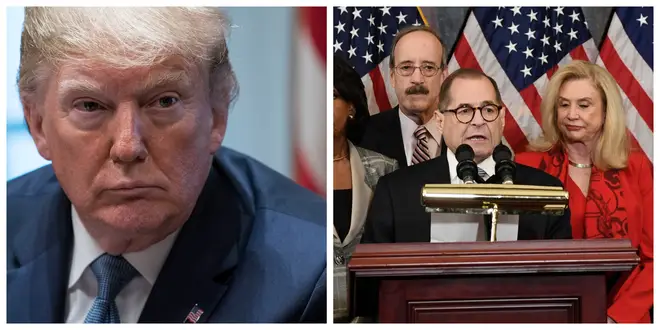
Nick Abbot 10pm - 12am
10 December 2019, 15:58
Two articles of impeachment have been introduced by the Democrats, charging President Donald Trump with abuse of power and obstruction of Congress.
The charges, unveiled on Tuesday, are related to the president allegedly putting pressure on Ukraine to announce investigations into his political rivals as he withheld aid to the country.
House Judiciary Committee Chair Jerry Nadler made the announcement on Tuesday.
He told a press conference: "[Trump] endangers our democracy, he endangers our national security.
"Our next election is at risk. That is why we must act now."

The President is yet to comment on the articles himself, but has previously insisted he has done “nothing wrong” and branded the process “madness.”
If the House Judiciary Committee votes to approve the articles, they will be submitted to the full chamber for a vote.
If that vote is approved, an impeachment trial will take place in the Republican-held Senate, possibly as soon as January.
President Trump’s campaign manager for 2020, Brad Parcscale, issued a statement on Twitter in which he wrote: “For months, Nancy Pelosi said she wouldn’t move forward on impeachment because it was too divisive and needed bipartisan support.
To Impeach a President who has proven through results, including producing perhaps the strongest economy in our country’s history, to have one of the most successful presidencies ever, and most importantly, who has done NOTHING wrong, is sheer Political Madness! #2020Election
— Donald J. Trump (@realDonaldTrump) December 10, 2019
“Well, it is divisive and only the Democrats are pushing it, but she’s doing it anyway.
“Americans don’t agree with this rank partisanship, but Democrats are putting on this political theatre because they don’t have a viable candidate for 2020 and they know it.”
The House has only voted against a president three times in history - Andrew Johnson, in 1868, who was later acquitted; Richard Nixon, in 1974, who quit before proceedings were completed; and Bill Clinton in 1999, who was also acquitted.
Democratic leaders say President Trump put his political interests above those of the nation when he asked Ukraine to investigate his rivals, including Democrat Joe Biden, and then withheld 400 million dollars in military aid as the US ally faced an aggressive Russia.
They say he then tried to obstruct Congress by stonewalling the House investigation.
In drafting the articles of impeachment, Ms Pelosi faced a legal and political challenge of balancing the views of her majority while hitting the constitution's bar of "treason, bribery or other high crimes and misdemeanours".
Some liberal legislators wanted more expansive charges encompassing the findings from former special counsel Robert Mueller's probe of Russian interference in the 2016 election.
Centrist Democrats preferred to keep the impeachment articles more focused on Mr Trump's actions towards Ukraine.
Asked during a Monday evening event if she had enough votes to impeach the Republican president, Ms Pelosi said she would let House legislators vote with their conscience.
"On an issue like this, we don't count the votes. People will just make their voices known on it," she said. "I haven't counted votes, nor will I."